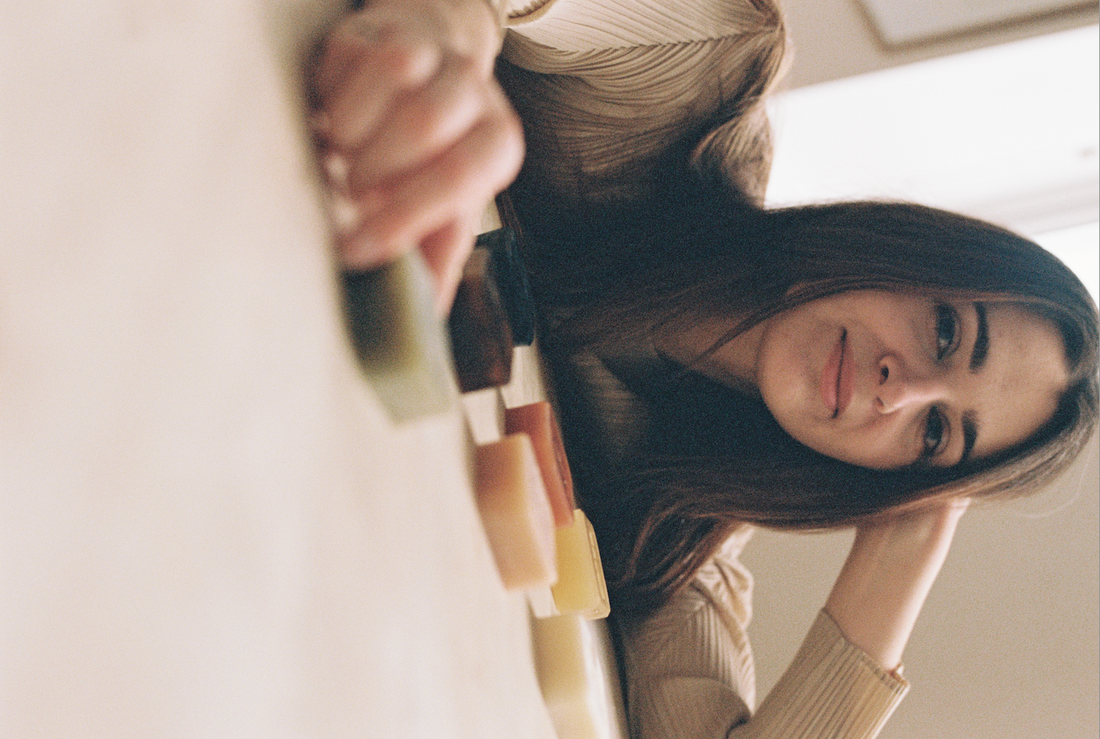
A conversation with the Founder and Creative Director: Léa Federmann Marsot
Share

-
What was the starting point for the brand? Where did the idea come from?
Léa Federmann Marsot: Navigating skin inflammation, my journey into crafting natural cosmetics unfolded over the past few years. The spark that ignited the soap-making adventure occurred serendipitously during a visit to my friend in Paris. While purchasing various ingredients for crafting natural cosmetics, I unwittingly acquired a soap base. The next morning, fueled by our shared interest in crafting and shared passion for holistic approaches, my friend and I embarked on a spontaneous soap-making session.
We were so into our newfound project that our plans for the following day were already centred around soap making. What began as an accidental encounter with a soap-making base swiftly transformed into a passionate endeavour. The positive reception fuelled my determination to delve deeper into the intricate art of crafting natural soaps, initially intended for personal use.
- How did you develop the idea and bring it to life?
Léa Federmann Marsot: The seven sins and virtues concept was born out of a desire to explore the ’duality’ and ’contradictions’ within us. I wanted to show how our light and dark sides are interconnected, complementary rather than opposite. Similarly, in life, where divisions exist, I aimed to make space for the inbetween.
The goal isn’t to eliminate our ’sins’ or ’darker’ sides but to be in tune with them, showing compassion and making space for these aspects. If we dare to recognise and face these parts of ourselves, it’s a significant step toward transformation and greater tolerance for others.

- What was the process behind creating the soaps?
Léa Federmann Marsot: I wanted to create a palette that could be good for different days and atmospheres, with different functions and scents. Each clay has its specificity but they can all be used by everybody. Some are more softening, hydrating, detoxifying, sensitive skin, etc.
Each soap is assigned to a sin, colour, scent and number. They are all uniquely handmade and hand-stamped creations, starting with a natural soap base of aloe vera and coconut. The addition of natural clay and essential oils, carefully measured for safety, is a crucial step. I personally developed all the recipes, ensuring compliance with the allowed amounts of clay and essential oils per gram, and had them validated by a toxicologist to ensure they are hypoallergenic.


- How did you decide on the ingredients and which soap represented which sin?
Léa Federmann Marsot: Choosing colours and scents was instinctive, considering the meanings of colours and what was achievable with natural clay. For instance, the white and unscented soap symbolises sloth. White, not traditionally considered a colour, represents laziness to me, and the absence of scent reinforces the soap’s concept of idleness. Wrath naturally found its place in red, reflecting societal and psychological associations with anger. Lust, like wrath, unmistakably took on a pink hue for me, seeing the world from its rose-tinted glass.
Green represents envy and longing for the green grass on the other side, thanks to its earl grey scent of Bermagot mixed with smoked vetiver essential oils. Black represents pride with the myths of Icarus, who burns his wing trying to reach the sun. Brown is greed with its patchouli and frankincense notes, for its resilience and maturity. In essence, each soap is a carefully crafted fusion of colour, scent and meaning, embodying the complexity and balance of the human experience.


- The brand draws on your interest in different cultures and spiritual practices, particularly Taoism. How did you discover Taoism and what role does it currently have in your life?
Léa Federmann Marsot: I discovered Taoism through my exploration of Tai Chi. The natural message that emerged within me resonated strongly with Taoist concepts, particularly the ’non-duality path’ and the idea that Tao (or Dao) means ‘the way’ or ‘the path’ of non-duality. This philosophy encourages living in harmony with the natural order.
The Yin and Yang philosophy of Taoism, symbolising the interplay of opposites, deeply resonated with me. Yin, representing qualities like darkness and receptivity, and Yang, symbolising light and assertiveness, illustrate the dynamic harmony of the Tao. While I don’t strictly adhere to specific rules or dogmas in my life, I draw inspiration from various spiritual philosophies or myths that align with my feelings. Taoism has become a meaningful influence, complementing other philosophical currents and mythologies such as Sufism and Greek mythology.
- What was the idea behind your slogan ‘wash away your sins’?
Léa Federmann Marsot: The concept behind the slogan ’wash away your sins’ might initially seem like a call to rid ourselves of our ’darker sides,’ but the essence goes much deeper than that. ’Wash away your sins’ is my way of playing with boundaries, refusing to conform to expectations. It’s the acknowledgement that we all harbour ’sins’ or ’darker’ sides within us. However, the intention is not to eliminate them but to utilise the introspective experience of a cleansing ritual. It’s a moment of intimate introspection—a time to think, reflect, tame, and transform. Through this process, we can start anew, entering a space of self with a refreshed and positive intention. It’s about embracing the complexities within ourselves and using them as a catalyst for personal growth and renewal.


